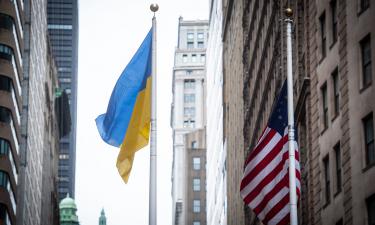Japanese FM: China and Japan to meet in Jakarta as dispute simmers
Japan said Thursday it hopes China will attend a summit between the countries' two leaders to defuse their worst diplomatic row in decades, but Beijing was still considering the offer even as it launched efforts to cool anti-Japanese anger.
Tensions between the two over World War II history, natural gas exploration and territorial disputes have escalated in a series of anti-Japan riots in China in recent weeks. Japan has demanded an apology, but the Chinese government has blamed Japan for the troubles.
The dispute threatens to overshadow a conference of Asian and African leaders, which both Chinese President Hu Jintao and Japanese Prime Minister Junichiro Koizumi are due to attend.
U.N. Secretary-General Kofi Annan has appealed for a peacemaking session, and some observers say a meeting between the two is urgently needed.
Japan's Foreign Minister Nobutaka Machimura said he was confident Hu and Koizumi would meet, but that no definite date had been set.
"As you would imagine, the schedule for the two leaders is extremely tight," he said. "But over the course of the three days in which the two leaders will be in Jakarta, I do believe there will be a meeting between (them)."
China said Thursday it was still considering Japan's proposal for a meeting.
"We will make the announcement when we have the information," Foreign Ministry spokesman Qin Gang said at a regular briefing.
Some speculated Beijing might not be willing to reach a settlement yet.
"China apparently wants to put pressure on Japan across multiple fronts," Dennis McNamara, a professor at Georgetown University, said in an e-mail exchange, so it's "not clear if China is ready to calm the waters."
But in an encouraging sign, China announced Thursday it was sending retired diplomats on a lecture tour of Chinese universities to explain the importance of Sino-Japanese relations.
"Peaceful coexistence and cooperation is the only right choice," said Foreign Ministry spokesman Qin Gang.
Anti-Japanese protests erupted after Tokyo approved a new history textbook that critics say downplays wartime Japanese atrocities, including mass sex slavery and germ warfare.
But Machimura denied the accusations Thursday, saying he didn't believe that the texts would cause "any problems with China, Korea or any other countries in Asia."
"Not a single textbook glorifies or justifies Japanese actions during the war whether it be the colonization of Korea or the invasion of China or acts of aggression in other parts of Asia," he said. "Though there may be discussions regarding these textbooks, I believe that no one has actually read the alleged textbooks in reality."
He added: "We are confident about our past record in the past six decades in promoting peace."
The downward spiral in relations with China has also has been fueled by disputes over Tokyo's effort to obtain a permanent U.N. Security Council seat and gas-drilling in disputed waters, as well as wider rivalry for regional dominance.
Some have suggested Beijing allowed the protests to undermine Japan's U.N. campaign.
China also is angry at Koizumi's visits to the Yasukuni Shrine in Tokyo, which honors 2.5 million Japanese war dead including executed war criminals.
The Asian-African Summit begins Friday, with nearly 50 delegations commemorating the 1955 birth of the Nonaligned Movement - ample time for Hu and Koizumi to meet along the sidelines.
A fence-mending mission to Beijing by Machimura last weekend failed after China allowed more protests and rejected Tokyo's demand for an apology.
China says its security forces have done their best to prevent violence during three weekends of anti-Japanese demonstrations in cities throughout the country.
AUDRA ANG, Associated Press Writer
Associated Press reporter Michael Casey in Jakarta contributed to this report.
Subscribe to Pravda.Ru Telegram channel, Facebook, RSS!




